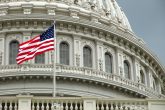May 26, 2021
America Must Rediscover Human-Rights Realism
It is neither an accident nor a coincidence that China is committing what many call genocide against Muslim Uighurs in Xinjiang, and that Russia has jailed the dissident Alexei Navalny. The Chinese need a quiescent Xinjiang because it is a key node of their Eurasia-spanning Belt and Road Initiative. The Kremlin needs government institutions to serve as a cover for wealth accumulation by a gangster elite, and thus sees Navalny as a major threat.
Both countries are in the grip of nervous autocratic systems that cannot afford to offer second chances to anyone. In carrying out their recent abuses, both have implicitly made certain calculations of how the United States and its allies will – or will not – respond
The US must not throw away the strategic advantage conferred by its longstanding commitment to human rights
A foreign policy dominated completely by human rights would be unsustainable, forcing the US to abandon core national interests – such as keeping the peace with other nuclear powers – and dragging senior policymakers into one humanitarian crisis after another. A policy that virtually ignored human rights, however, would reduce the US to the one-dimensional realpolitik that characterizes Chinese and Russian behavior. A concern for human rights is what differentiates the US from others as a great power.
This difference is all the more important at a time when many US allies will soon list China as their biggest trading partner. As China’s economic clout grows, an America that cannot appeal to its allies’ core values will soon find itself at a distinct disadvantage. True, Asians and Europeans talk a good game on human rights while practicing a ruthless realpolitik themselves; but the fact that they recognize the need to talk that game speaks not only to how they want to be viewed, but how they want to view themselves
Read the full article from Project Syndicate.
More from CNAS
-
Why Biden Should Extend Vaccine Diplomacy to Sanctioned States Like Venezuela, Iran, and North Korea
Extending vaccine diplomacy to heavily sanctioned countries will allow Washington to both hedge against growing Chinese-Russian influence abroad and help alleviate global huma...
By Jason Bartlett
-
Getting Caught Trying the Unlikely; What is to be done?
John Batchelor interviews Richard Fontaine about the Biden Administration and foreign policy. Listen to the full interview from The John Batchelor Show....
By Richard Fontaine
-
Securing U.S. Democracy Initiative
The Liberal Internationalist Origins of Right-Wing InsurrectionAmerica’s grand strategic commitment to an overmilitarized form of deep engagement abroad was always going to culminate in a direct affront to democracy....
By Van Jackson
-
National Security Human Capital Program
Building Better GeneralsIn Building Better Generals, the CNAS Responsible Defense (RD) team urges policymakers and military leaders to redouble their efforts to create an “adaptive and creative offic...
By Katherine Kidder, Kelley Sayler, Nora Bensahel, David W. Barno & USA (Ret.)


